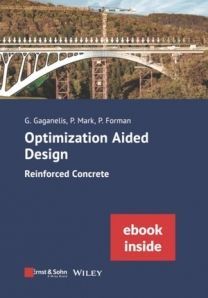Table of contents
Foreword by Manfred Curbach
Foreword by Werner Sobek
Preface
Acknowledgments
Acronyms
1 INTRODUCTION
2 FUNDAMENTALS OF REINFORCED CONCRETE DESIGN
2.1 Basic Principles
2.2. Verification Concept
2.3 Safety Concept
2.4 Materials
2.5 Load-bearing Behavior
3 FUNDAMENTALS OF STRUCTURAL OPTIMIZATION
3.1 Structural Optimization Approaches
3.2 Problem Statement
3.3 Lagrange Function
3.4 Sensitivity Analysis
3.5 Solution Methods
4 IDENTIFICATION OF STRUCTURES
4.1 One-material Structures
4.2 One-material Stress-biased Structures
4.3 Bi-material Structures
4.4 Examples
4.5 Applications
5 INTERNAL FORCE FLOW
5.1 Preliminaries
5.2 Continuum Topology Optimization (CTO) Approach
5.3 Truss Topology Optimization (TTO) Approach
5.4 Continuum-Truss Topology Optimization (CTTO) Approach
5.5 Examples
5.6 Applications
6 DESIGN OF CROSS-SECTIONS
6.1 Problem Statement
6.2 Equilibrium Iteration
6.3 Sectional Optimization
6.4 Solving
6.5 Parameterization
6.6 Examples
BIBLIOGRAPHY
LIST OF EXAMPLES
Variation of volume fraction
Variation of the filter radius
Variation of material parameters
Form finding of bridge pylons 1
Form finding of bridge pylons 2
Conceptual bridge design 1
Conceptual bridge design 2
Multi-span girder
Multiple load cases
Two load cases
Material steering
Material variation in bi-material design
Filter radius with bi-material design
Bi-material multi-span girder
Bi-material girder with stepped support
Bi-material arch bridge
Deep beam 1
Wall with block-outs
Corbel
Cantilever beam
Shear transfer at joints
Deep beam 2
Frame corner
Wall with eccentric block-out
Corbel with horizontal force
Stiening core with openings
Deep beam 3
Deep beam 4
Deep beam 5
Strain plane of an unsymmetric RC section
Footing with gapping joint
Parameterized T-section
Parameterized uniaxial bending
Shape design of a RC I-section
Shape optimization of a footing



